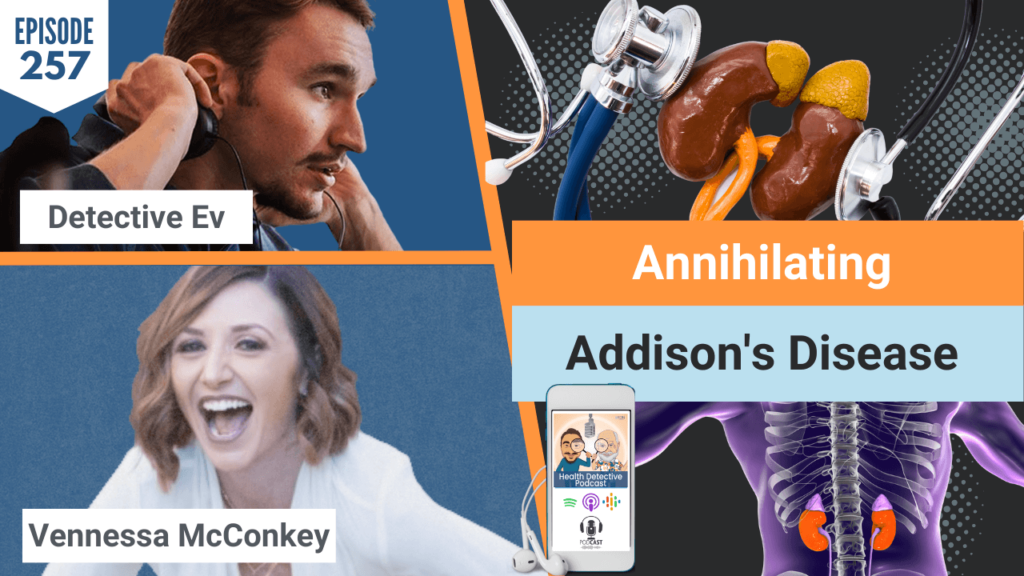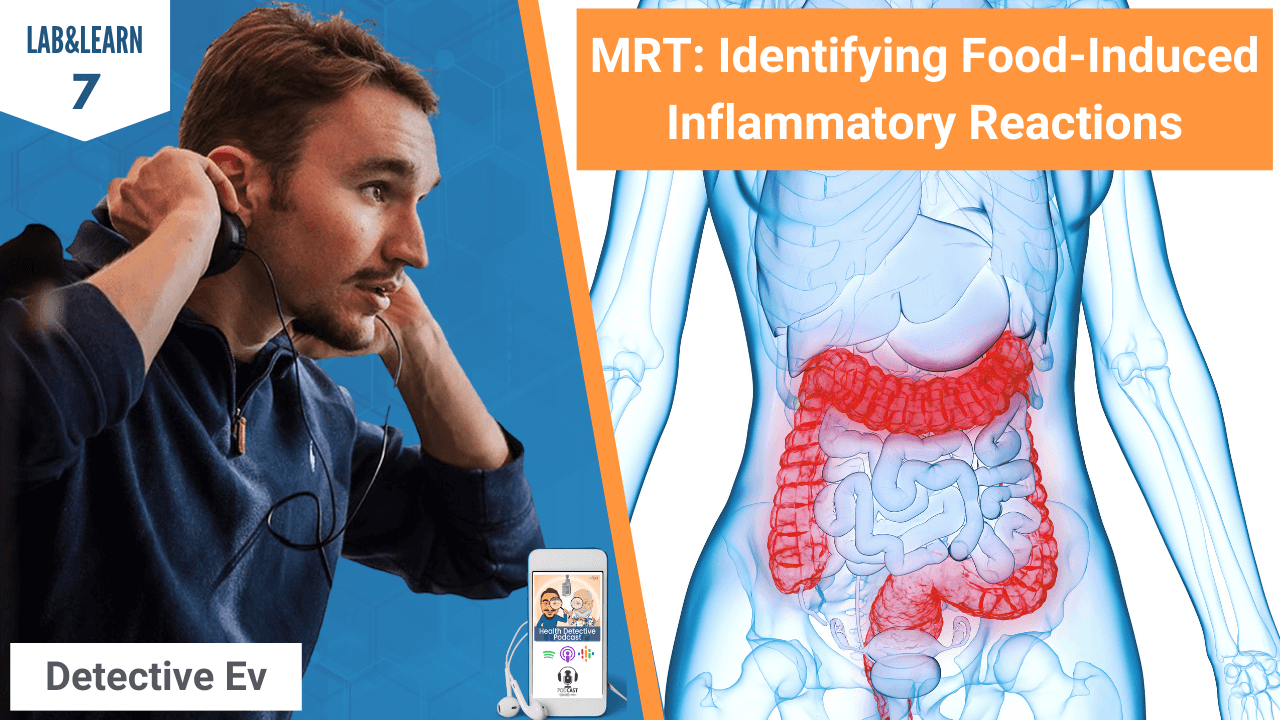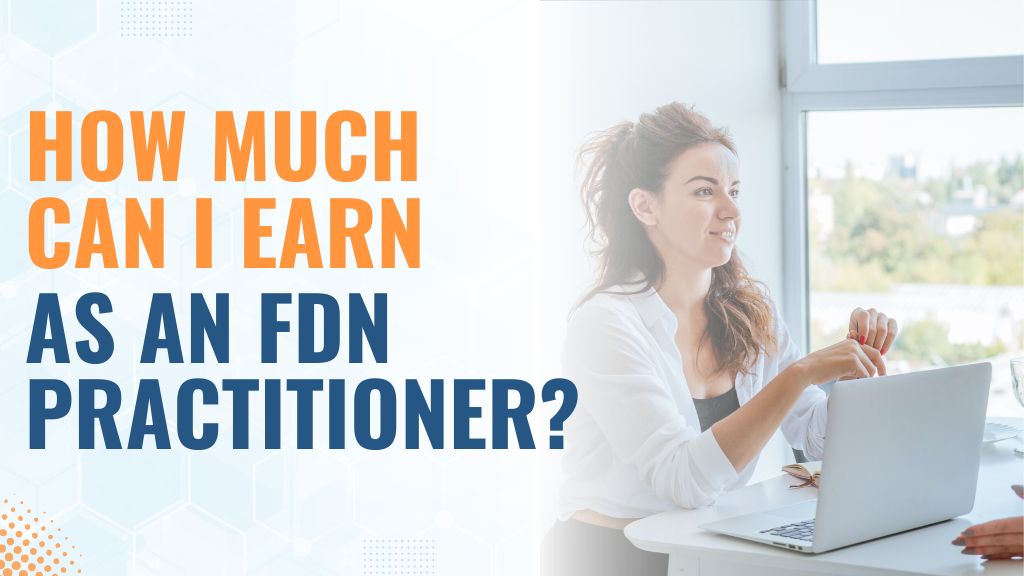Introduction
[00:00:00] Detective Ev: Hello my friends. Welcome back to another episode of the Health Detective Podcast by Functional Diagnostic Nutrition. My name is Evan Transue, aka Detective Ev. I will be your host for today’s show about Addison’s Disease.
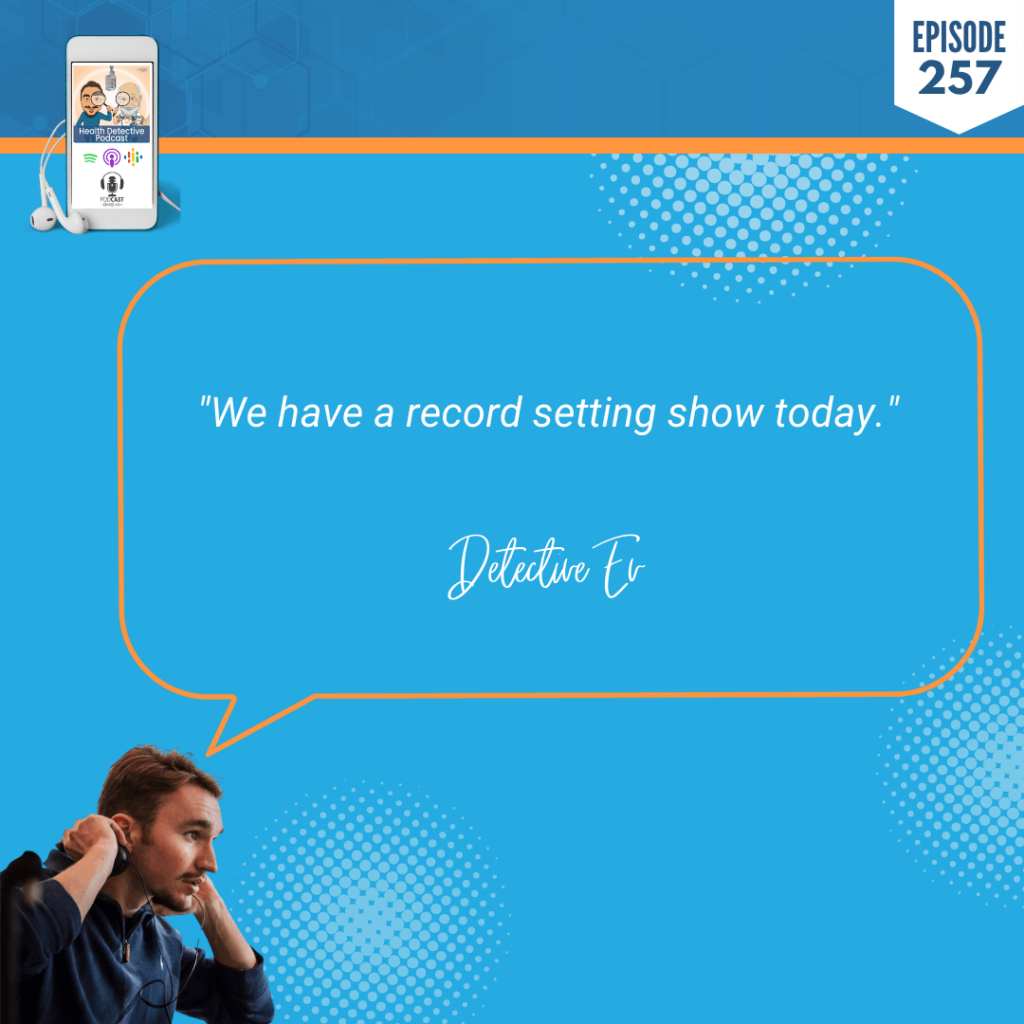
We have a record setting show today. I have never had a guest take my first question and run with it as far as our guest Vennessa did today. I don’t mean that poking fun or giving her crap, it’s quite the opposite. It’s the ultimate compliment as a host to just allow the person to do their thing for that long. That means they are telling an amazing story, what they’re saying is coherent. It has a beginning, middle, and an end.
And Vennessa, whether or not she realizes it, I told her afterwards, so I hope she realizes it, has an amazing ability to tell a story, get you involved in the emotional side, bring you through the highs and the lows. I didn’t even realize myself how much time had passed because I found myself so engaged with the story. I think you guys are going to love this one.
We also are a show where we like to talk about the resolution a lot, and we do get to touch on that today. But with how much time we spent on the story, I knew immediately it’s only fair that we have a part two. Vennessa won’t be coming on immediately next week. We have other guests that we need to get to and stuff. But she won’t be coming on in six months either; it’s going to be some time before there. I look forward for that. I’ll link the first episode once that comes back around in case you missed this one.
Addison’s Disease: Relying on Many Different Medical Professionals
Anyway, Vennessa McConkey is our guest today. She is a passionate, energetic, tenacious woman, wife, and mom of three young boys. Now, there’s very few people that would label themselves that way. But I can absolutely say that is a 100% accurate description that will be inherently obvious five minutes into the interview. She has always believed in helping people, whether it be in the community, schools, or corporate world.
Her career started early since both her parents and grandparents were business owners. Hard work was highly valued in her family. She attended a science and engineering academy through most of high school, attended Southern Illinois University for Industrial Engineering Technology, graduating in only three years.
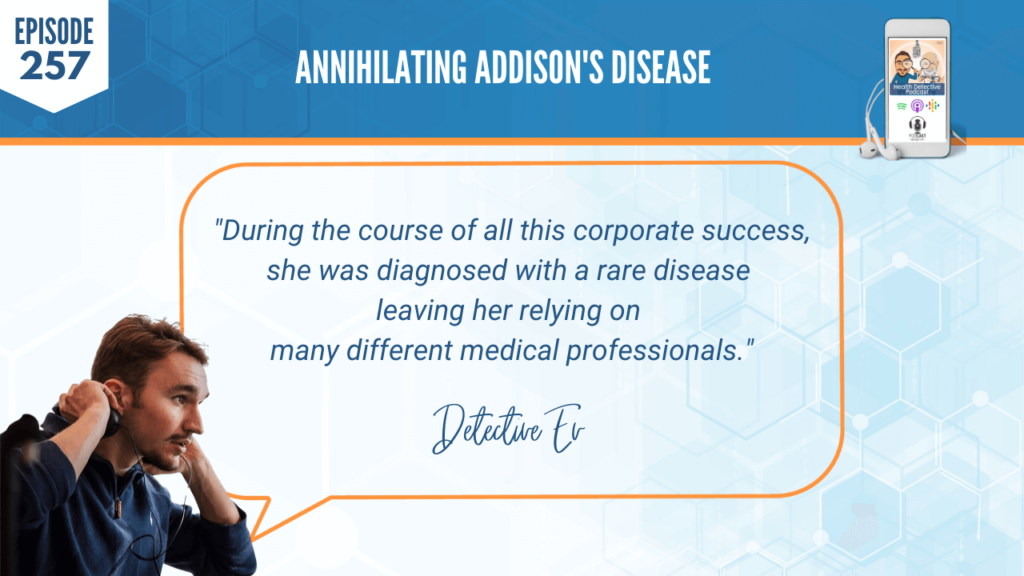
She worked her way up the corporate ladder very quickly and found herself running organizations at a young age. During the course of all this corporate success, she was diagnosed with a rare disease leaving her relying on many different medical professionals. She finally ended her corporate career and her husband and her became pregnant with her first son.
Life seemed good. She started a resume writing and executive career coaching business where the skills she learned in corporate, once again created great success. But two things happened. One, her health took a nosedive, and two, she noticed 85% of her clients struggled with health issues that were affecting how they performed at work. No longer could she morally help people find jobs if their health was affecting more than just them.
While taking a sabbatical, she uncovered some hefty relational issues with her husband and her parents, leading to her discovery of functional nutrition and FDN. This ultimately uncovered how trauma creates disease for her.
Addison’s Disease: The Mountain Peak is in Sight
Now as a board-certified holistic autoimmune and trauma recovery practitioner, FDNP, certified functional nutrition coach, speaker, and author, Vennessa educates and empowers people to take control of their fatigue and pain during the in-between moments while confidently owning their journey so they can live a vibrant life.

Sit back and relax for this one. It is a bit of a heart string puller, if you will. Again, there’s some great moments, there’s some tough moments, but it all ends with just a beautiful resolution to this. I would say the best way to describe Vennessa’s journey, and I’m sure she would agree, she’s still on the mountain like many of the people that come on this show. She’s still on the mountain, but man, she’s close to that peak. It’s within eyesight, she can see the top of it, and it’s an amazing thing.
Without further ado, let’s get to today’s episode.
Alright. Hello Vennessa and welcome to the Health Detective Podcast. How are you?
[00:04:05] Vennessa McConkey: Great. How are you doing? Thanks for having me on.
[00:04:07] Detective Ev: Yeah, I’m doing very well. We’re glad to have you.
It’s always nice to have someone else that does podcasting too. It feels pretty good being on the opposite end, doesn’t it? It’s a nice little change of pace. I don’t know if you relate to this at all. It’s not a ton nowadays, thankfully, but I feel more pressure doing this than being on the other side at this point, just cause I feel so responsible for guiding it correctly and making sure everything’s good.
And then if I’m on the other side, I’m like, all right, cool. Ask me questions; I got answers to this stuff. So, it goes back and forth.
Addison’s Disease: Not Really Feeling That Great
[00:04:33] Vennessa McConkey: That’s exactly true. No joke. I was recording one earlier this week and I could not say “metabolism” for the life of me. I was like, you know what, whatever. But you’re right. It’s totally different being on the other side.
[00:04:45] Detective Ev: Yeah. And it’s fun in both ways. It’s just different.
I know you’ve gotten to listen to some episodes of ours, and obviously you’re an FDN yourself. One thing I always like to touch on is the journeys and stories that people took to get into this kind of space. I’m going to guess maybe you had some health challenges in your life, maybe one or two.
[00:05:04] Vennessa McConkey: Nah, I don’t think I had any. I think I’m good. We’re just going to chat about life, and you know.
[00:05:10] Detective Ev: Obviously, the audience knows cause they would’ve already heard the bio. We talked about you graduating, you got this engineering thing, so things were going well, I’m guessing. But somewhere along the line here, things were not going well with the health side. So, I guess the question is, when did the first health symptoms start for you and what did they look like?
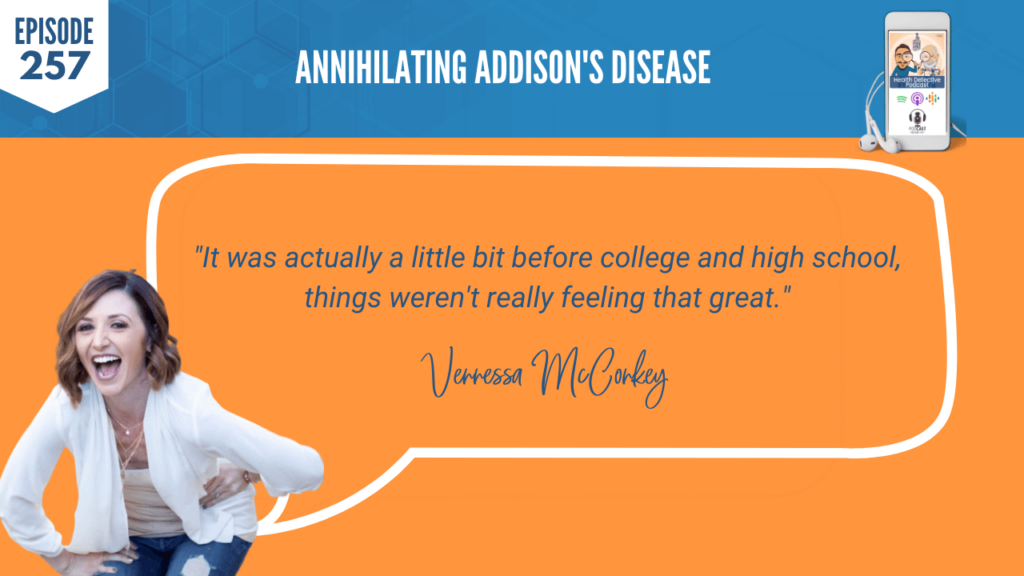
[00:05:27] Vennessa McConkey: That’s a really great question. Life was good, so I thought, all these years. Like you said, I graduated with an engineering degree three years, had a job right away, all these things. And it was actually a little bit before college and high school, things weren’t really feeling that great.
Addison’s Disease: Dizzy and Lightheaded
I was in an engineering academy in our high school and just very driven, very just Type A personality, doing all the things, trying to be involved in a million things at the same time cause that’s just kind of how I was brought up. It’s like you get involved, you do things, you drive things.
I started feeling just dizzy and lightheaded. At that same time, my mom was studying naturopathy. We were like, okay, what could this be? Could it be hay fever, could it be allergies? And we were always her Guinea pigs, like, try this, try this. Let’s see what happens. It was a good and a bad thing.
We go on the model of test don’t guess. Well, that was the opposite in my home. It was just guess and not test. You don’t have to go into the doctor. Yeah. To my sister, you broke your arm roller skating? It’ll be fine. We’ll just play around with some herbs. That’s literally how it was which was good in some aspects.

But I would wake up just dizzy and lightheaded. I was in volleyball and did a lot of running. There’d be times I would black out and whatnot. I’m like, what’s going on? This isn’t right. And my mom was like, oh, just take this antihistamine stuff and you’ll be okay. And I thought it was working.
A lot of times we’ll hear in the space, it’s in your head, right? And so I was, okay, this is working for me. Then I got into college and did the whole college thing. Thank God there was no social media when I was back in college, but we won’t go into that.
Addison’s Disease: Trying to Take Time Off
I was doing all the things and in engineering, driving back and forth. I went to school in Southern Illinois, you guys heard from the bio. It was crazy, lots of crazy times. And I quickly got out of school cause I’m like, this is easy. This was nothing to me. I’ve done more than this in high school than you guys have done blah, blah, blah.
I get out of college and get into my first job, which I had an internship in. So, I already had that set for me, which was great. And I was like, something isn’t right. Something just doesn’t feel right. What am I doing? Again, it was the dizziness coming on. I started getting really fatigued and I was like, maybe I’m just working too much. I was working at restaurants at nights, and I was working at the engineering job during the day.
My engineering debt, it was a lot. My parents were those parents like, oh, we’ll pay for the first month of college and then the rest is on you.
Detective Ev: Sounds good the first month.
Vennessa McConkey: It sounds good as a parent. I mean, I got three boys of my own. I’m like, you know what? Yeah, that sounds great. But at the same time, it actually put on some more stress on my body. And I was like, I’ve got vacation built up. Let’s take some time off. Let’s see what happens.
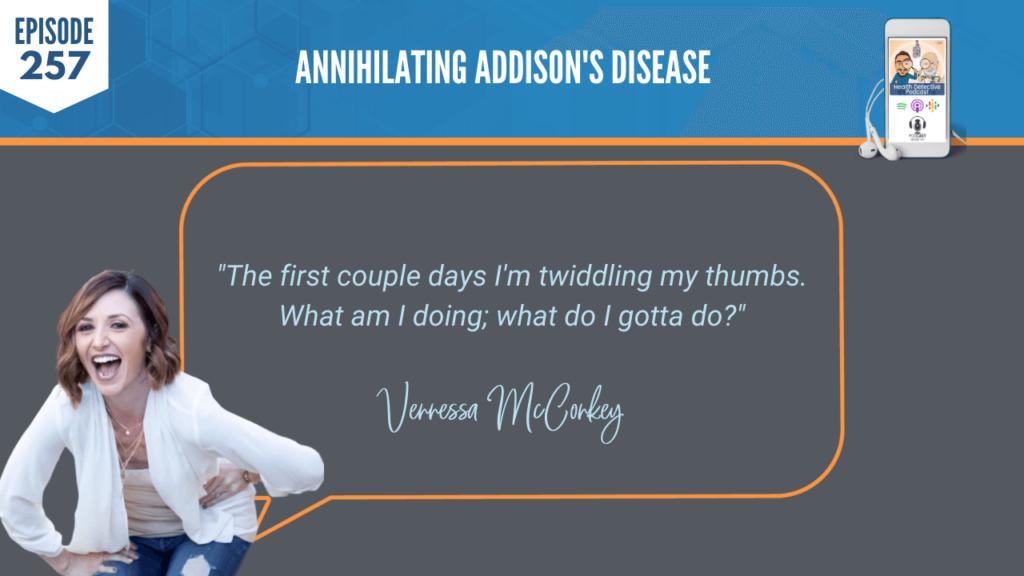
I took a week off. And the first couple days I’m twiddling my thumbs. What am I doing; what do I gotta do? Just constantly wanting to go and do and go and do but I would still be waking up fatigued. I was just drained.
Addison’s Disease: Running Tests & Looking Okay
I was like, I’m a runner too. Maybe I should stop running for a little bit. Okay, that didn’t work either. I was like, all right, whatever.
Finally, at that age, when you’re in your young twenties, do you want to reach out to your parents again? No, you don’t. But I reached out to my mom with her studying that. She had graduated naturopathic school. I was like, I’m feeling just drained and exhausted, and nothing is working. I wake up and I’m still tired, or I’m tired within the first hour of waking up. What’s going on? I’m still getting kind of dizzy but I gotta work. I can’t just not work. Something has to happen.
She was like, well, I’m going to refer you to someone cause I don’t really want to deal with my daughter. It’s kind of a conflict of interest at the same time. So, I went in. First of all, they looked at me and they’re like, you’re kind of thin. I’m like, do you go up to a fat person and say you’re kind of fat? No.
[00:09:29] Detective Ev: Hey, I honestly get that very much.
[00:09:31] Vennessa McConkey: I mean, if you can see the video, I sit there and I can put my hands around my wrist. Like, okay, so what? I’m thin, right? Whatever. They were like, well, let’s just run some tests and whatnot.

Everyone knows, they run a basic CMP panel. Everything looks kind of good. You might have a sickness. Okay, infection going on. Let’s just give you some vitamin C and let’s go on. That’s basically what it was. I was like, this is not working.
Addison’s Disease: A Food Diary & A Saliva Test
Yeah, it was around wintertime, so maybe I did have a cold or whatever it was, but that doesn’t explain the last handful of months. So, I just kept going about my business and then came on again. I’m like, okay, mom, this isn’t working. Do you have another referral in your database basically?
She was like, why don’t you go to one of the ladies at my naturopathy school. She’s been doing this a lot longer. They usually do a lot of practicals and things like that. They sit down with you. I’m like, all right, fine. I don’t have time for this, but I have to make time for this.
And I sat down with her. She went through a couple hours of, what’s your background? What’s your lifestyle? Anyone who’s sat down and worked with a good naturopath has done that. And I’m like, okay, can we get to the point? She’s like, all right, let’s record a food diary for a while and then we’ll talk next week. I’m like, are y’all kidding me right now? I need something, right? We are all in this society of like, I need something now. And that’s where I was at.
I’m like, I am very busy. At that time my engineering profession was moving into management. And I’m like, I don’t have time for this. I’m working 60 hours plus a week. I don’t have time for this.
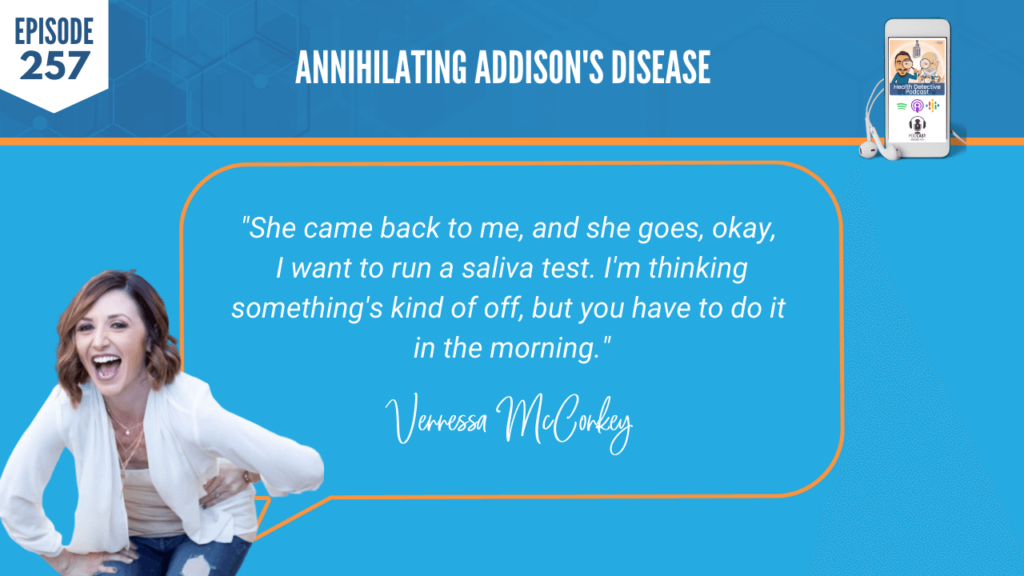
So, she came back to me, and she goes, okay, I want to run a saliva test. I’m thinking something’s kind of off, but you have to do it in the morning. That’s right; I’m getting no explanation. This is back in 2006. I’m like, I’m getting no explanation here.
Addison’s Disease: Addison’s Diagnosis
What’s going on? Why are we taking this test? Whatever. You’re the professional, not me. I’ll just do it and call it a day. You know? So, I did the saliva test.
Couple weeks later, she’s like, okay, it looks like you probably have some cortisol issues. I’m like, what is that? Can I get any explanation? She’s like, it’s just really low. I’m going to refer you out. And so, I’m like, oh my gosh. This is ridiculous.
This type of thing went on for another year of me getting referred out and testing things, and then saying, oh, well it’s kind of normal but it’s okay. Why don’t you go back and get some rest? Or why don’t you reduce the stress in your life and whatnot?

Then it was finally in September of 2007, I get a call from yet another test that was run. They’re like, okay, well you have Addison’s disease. I’m like, what does that mean? Again, back then I’m like, I have no idea.
I’m a research nerd, so that night I’m at Barnes and Noble and I’m at the library. And I’m doing all this, trying to find anything. There were two books on this. I’m like, I have no idea what this is. It says it’s rare. What am I supposed to do? I’m supposed to have another call with this doctor tomorrow because I was at work, and I had to go.
So, I get on the phone call with him and he’s like, you’re going to be on this medication. We’re going to start you with prednisone. You’re going to be on a high dosage of it because we gotta boost your body up and get it back to where it’s supposed to be at.
Addison’s Disease: Thyroid Issues & A Supplement
I know you’re living by yourself right now. Find some place, like a parent’s or sibling’s place to stay, because you’re going to be sleeping a lot for the first few days. I’m like, I don’t have fricking time for this, right? I don’t. So, we picked that next weekend and my mom’s like, just trust him. I kind of know what he is doing. Okay, fine.
In that weekend I slept like 14 hours the first night, another 13 hours the next night. So, I’m like, okay, this feels good, but I’m still not feeling there. I gotta go to work on Monday, right?
Then we’re playing around with dosages and things like that. They put me on 35 milligrams of prednisone for, at that time, 115-pound young woman. That was a lot. And so, all of a sudden over the next year and a half, my face was just blowing up. It looked like a big puff fish. And I’m like, okay, whatever. Do I have to be on this for the rest of my life? Something just didn’t feel right.
For anyone who doesn’t know what Addison’s disease is, it’s an adrenal insufficiency. Basically, they tell you that your adrenals are shot. It can’t produce anymore cortisol, and you just have to be on medication the rest of your life. It’s a rare, rare, autoimmune disease. Something in me was like it doesn’t feel right.
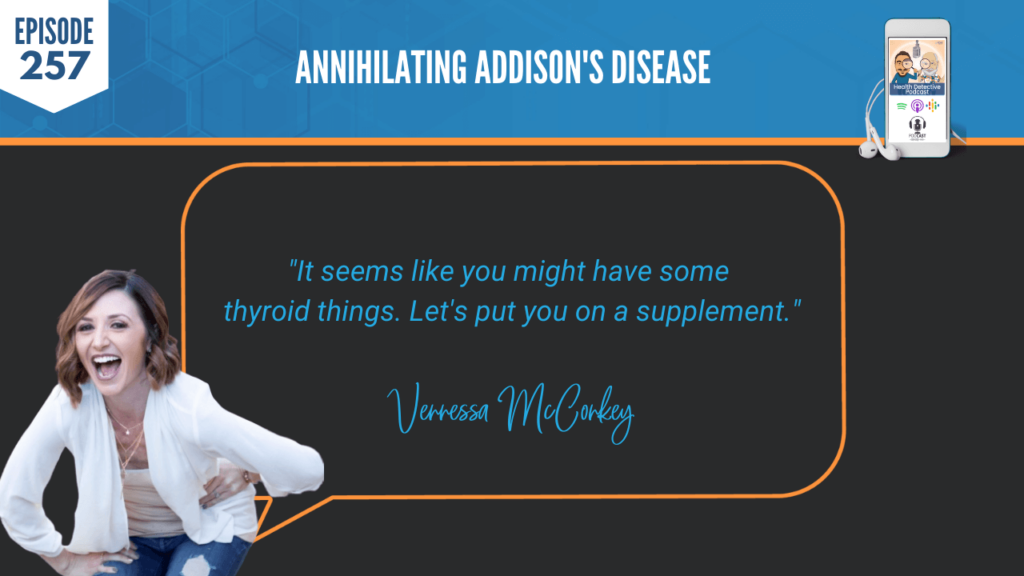
And then it was the next year after I was diagnosed, they’re like, okay, well we’re running your annual panels. Let’s go through that process. And it seems like you might have some thyroid things. Let’s put you on a supplement.
Addison’s Disease: Hydrocortisone & Florinef
The conventional doctors are putting you on another medication. But it’s like, let’s just supplement to get you back into the paperwork range. And I’m like, okay.
Then I went on this supplement for thyroid, and I was so high energy after that. I was in meetings and I’m like, I can’t even sit still. Like I am shaking so much the first couple of days. I’m like, I’m off of it. Nope. I am pulling myself off of this. I don’t care who says what; I’m not taking this.
Then I started questioning a lot, verbally questioning my doctors. I’m like, I know I’m not a doctor, sorry, but why am I on this much prednisone? My face is blowing up. I mean, you could look at pictures before and after and I’m blowing up. I still weigh the same; I still feel the same; I’m still fatigued. They say I have thyroid issues. What proof is there? I don’t understand. And, Vennessa, you just have to. Okay, maybe we’ll reduce your dosage. I was on prednisone for almost five years.
[00:14:41] Detective Ev: Whoa.
[00:14:42] Vennessa McConkey: Yeah, whoa, right? Almost five years.

So, I’d end up in that timeframe moving to Arizona. My husband and I met in college, and I’d moved to Arizona. We had started dating. And the naturopath there was like, okay, let’s switch you over to hydrocortisone and Florinef. I’m like, okay. And she’s explaining why.
I’m like, all right, that makes a little bit more sense. She goes, we’ll put you on a small dose. If you need more, we can always up dose you, but we don’t want to put you on too much if you don’t need it. So, I’m like, okay.
Addison’s Disease: Pregnant & Coming Off Meds
And then it was just all these other things. I thought I was happy. I was in sunny Arizona instead of Chicago and dreary. It was just, everything was free and whatnot. You know, you’re dating someone; we ended up getting married, all these things. I still had a fun job where I was traveling all over the place. And all of a sudden, I was like, I’m getting stressed again. This isn’t fun.
I was traveling three weeks out every month, going to different corporate companies around the country and training people. We had three shifts. I was in manufacturing at the time, and I was in this C-suites. And I’m like, I’m going all over the place; I’ve gotta take a sabbatical. I told the investors, I’m like, I have got to. Just give me two months; I just need a break.
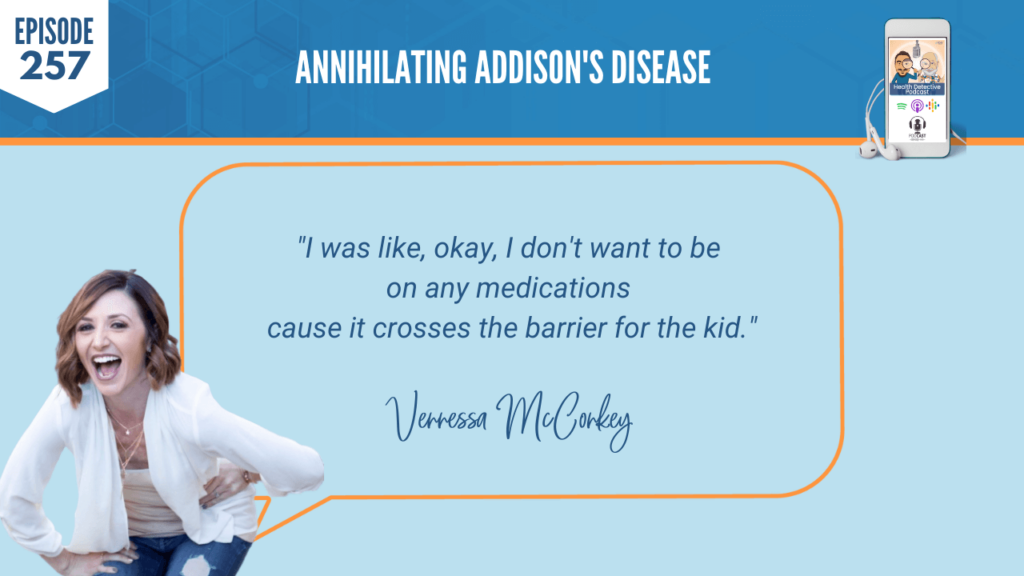
In that time, we got pregnant with our first son. And I was like, all right, I don’t want to go back. But I was still feeling just drained. I was excited about being pregnant and having a kid. And I was like, okay, I don’t want to be on any medications cause it crosses the barrier for the kid. I’m like, I just don’t want to. But I should, should I, you know?
So, I pulled myself off. I didn’t even tell my naturopath, I just pulled myself off of the medications. And I felt fine. The pregnancy was fine. The delivery, he just had the cord wrapped around his head and they had to use the forceps. Any woman out there has had that happen, it’s like, yikes.
[00:16:22] Detective Ev: I was actually, yeah. Well, I didn’t have that. I was the baby, to be clear.
Addison’s Disease: Food Sensitivity Test
[00:16:26] Vennessa McConkey: Yeah. I was a forceps baby too. And it was like, man, no, no, no. I mean that thing’s digging in there.
And so, everything was good. He ate well; he slept well, all these things. I’m like, this is great. So, I just put myself back on a small dose. I took myself off the Florinef, I don’t know why. I just will do the hydrocortisone; I’m fine.
And then it was shortly after, we had gotten pregnant with the second child. I’m like, okay, let’s do this all over again. But I’m like, I’m going to keep myself on a low dose. I don’t know why; I was playing the guess game. You know, I wasn’t testing; I was playing the guess game.
With that pregnancy it was, you’ve got a young toddler, barely. He was barely walking. You’re pregnant and you’re trying to do all that stuff. He was still sleeping fine, but I wasn’t because this one was just a fricking nightmare. I was having all kinds of food issues. Dairy, for some reason, I couldn’t tolerate anymore. I was like, what’s going on?
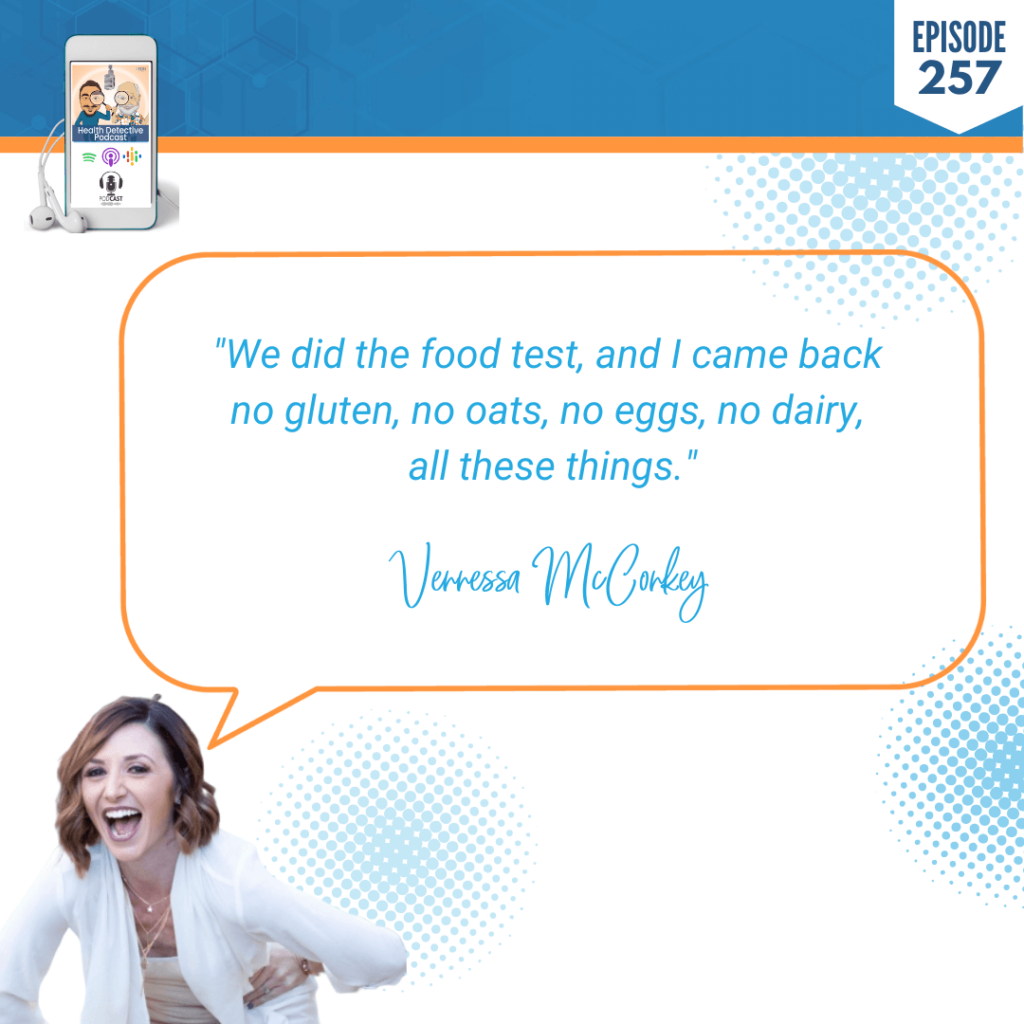
So, we did a food test. My naturopath was like, I know this is going to be a little off because you’re pregnant but something’s going on. We did the food test, and I came back no gluten, no oats, no eggs, no dairy, all these things. And what does everyone think when they get those back? Oh crap, what can I eat?
Detective Ev: Yep, you’re right.
Vennessa McConkey: And so, I was like, what can I have for breakfast? I can’t have eggs; I can’t have oats; I can’t have toast. And this was back before like all the decent gluten-free stuff that they have out there now.
Addison’s Disease: Hashimoto’s
This is like basically the most disgusting brownies you could eat. I mean, it was so nasty. And I was like, forget it. I’m just going to have freaking smoothies. I don’t care. And so I went that route.
The rest of the pregnancy was decent, and delivery was okay. But that kid came out, and still to this day, he’s six years old and hasn’t stopped crying and whining about stuff. I mean, it is nonstop. I went into postpartum depression with him. Again, shortly after that, still going through the postpartum, I got pregnant again. I’m like, how does this keep happening?
My mom’s like, so we want to explain how this keeps happening. I’m like, okay, fine. You know, whatever. I know how it happens.
[00:18:31] Detective Ev: Yeah, I know literally how it happens.
[00:18:33] Vennessa McConkey: Not a conversation you want to have with your mother about how it keeps happening.
But so, with that one, I had the depression. And my naturopath was like, okay, Vennessa, you’re on all these supplements for stuff. We’ve eliminated foods, you’ve got the Addison’s, let’s do some testing. We know again, you’re pregnant, but we gotta do something.
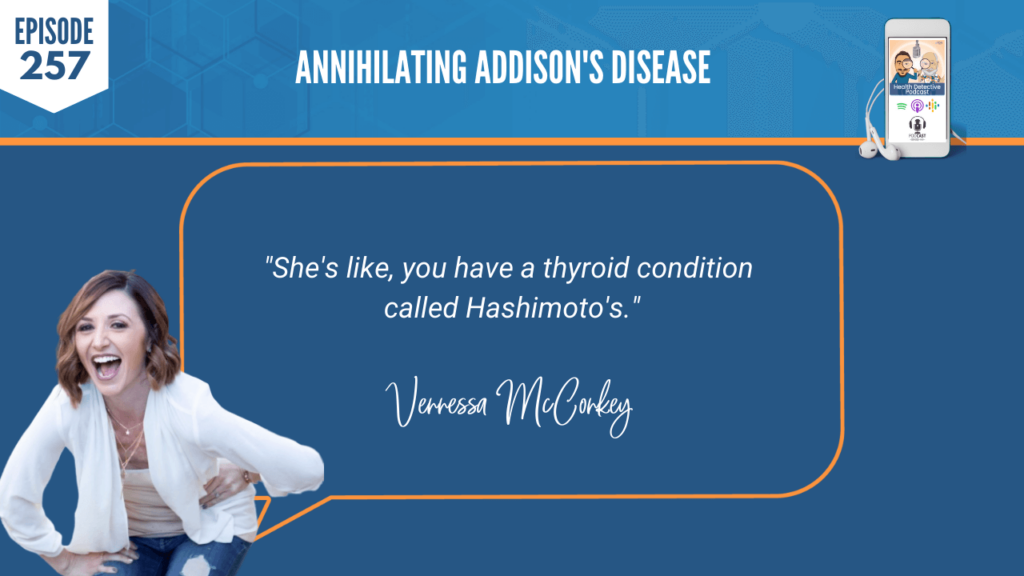
We did thyroid testing, and I was like, I’ve done this before. We know there’s something there, but like nothing, whatever. Well, my antibodies at that time, they were at 400 and something. And I was like, what does this mean? She’s like, you have a thyroid condition called Hashimoto’s. And I’m like, what? Okay, what I have to do?
She’s like, we are already doing the gluten-free and all this stuff. Okay, we’re going to have to do thyroid medication. I’m like, oh my, can we wait till after the baby’s born, like this third one’s done?
Addison’s Disease: Another Baby & Another Medication
And she goes, but we are because of your depression. She goes, we can only take so many natural things. Let’s put you on a small dose of an antidepressant. I’m like, oh my gosh. I have three months left of this pregnancy. It’s already a high risk one too. And we were going in every week.
The kid’s belly was measuring massive. I’m like, oh my gosh, the kid’s going to come out no matter what. What is going on here? We finally said, stop. We’re not going in for the specialist appointments anymore. I said, just let’s get through this delivery. Like it’s fine.
The kid came six and a half weeks early, had no other complications in the delivery room, nothing, just the fact that it was early. I was just sitting there; I’m like, what’s that feeling? Oh yeah. Okay. We should probably go, this is way too early, but let’s go. All right.
I couldn’t feed at the hospital at the time, so we had to pump. After that though, two weeks in, he regained all of his weight. He was good, ready to go. The kid is a feisty little son of a gun now.
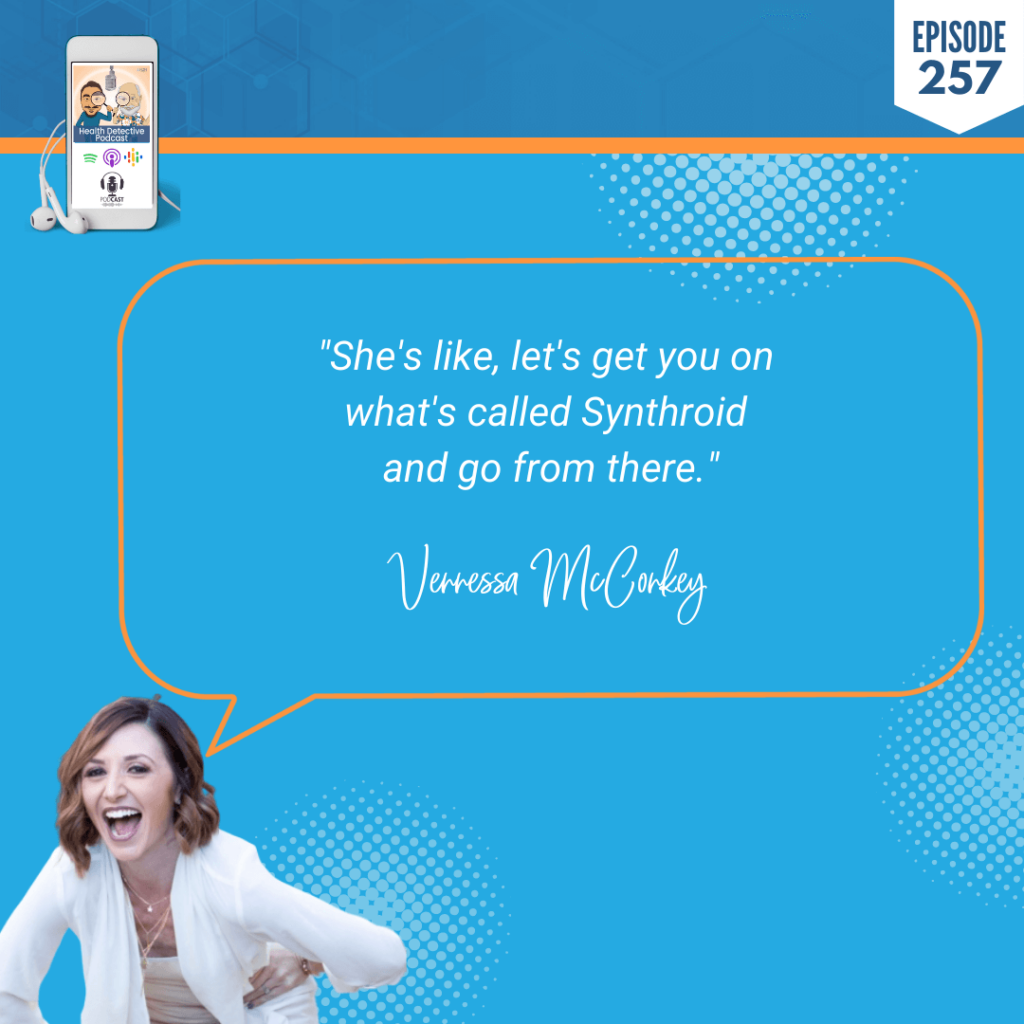
I got off my antidepressants and we re-looked at the thyroid. And I’m like, what’s going on here? She’s like, okay, now it’s at 800 and something. Your body’s been through a lot. It’s now a handful of months after the kid’s been born. You’re done with pregnancies, right? I’m like, yeah, God, three in three years is fine. I’m good. And boys, all three boys, by the way, I’m good. She’s like, let’s get you on what’s called Synthroid and go from there.
Addison’s Disease: Going Crazy in the Head
Now I’m questioning more, how is this affecting the Addison’s and why am I getting another one? I don’t understand why. Like, this doesn’t feel right. She’s like, just let’s do this.
And then we started doing other tests. We were doing gene tests. We found out I have a MTHFR mutation that was causing me to have methylation issues, energy levels, and why I was fatigued and wasn’t sleeping, all these things. I’m like, but it’s part of being a mom. She’s like, no, it’s not. So, we just supplemented the crap out of stuff. Just tons of tests. I probably was having 20 to 30 tests run a year.
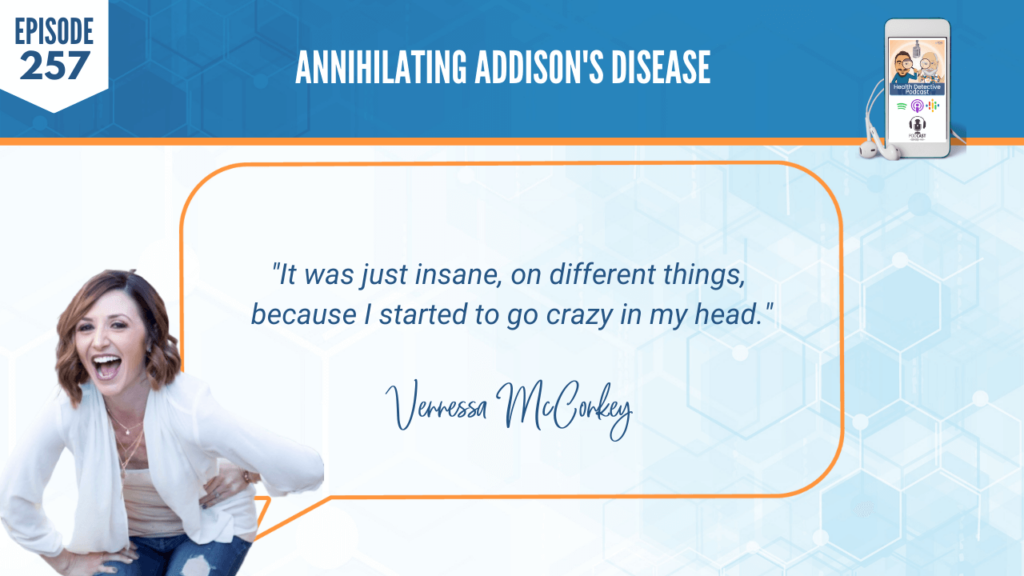
It was just insane, on different things, because I started to go crazy in my head. Cause I was like, okay, now what? Something else, something else has gotta be wrong, it’s gotta be wrong. It’s, you know, something like that. All at the same time, I was running my own career coaching and resume writing business for executives. Why not just have something in there? It’s part of the personality, right? Just why not? Let’s keep adding things in there because I have to be doing something all the time instead of being a human being.
And in all of that, we went through the whole 2020 thing, having everyone at home. My husband was already at work from home, but he was able to go in an office. Then you’ve got three very, very young kids, your husband at home, you at home, everyone trying to do these things. We had school.
Addison’s Disease: Finding FDN
I was very excited that year because right before it all happened, my oldest, who is a nonstop talker and very full of energy, by the way, he had apraxia, so he didn’t talk for a long time, and then he started talking and he won’t stop, he was going to go to school. It’d be great that I’d only be back to two of them for the day. I can handle that. Yeah, no. Okay, let’s have Covid. Let’s just have everyone at home, right? That’s just whatever. So, it was a lot of stress.
It’s just stressful in general for a mom to have their kids at home. We love them dearly, but as I talk to other moms, like we love and hate them all at the same time. Like we just can’t explain it. It’s a lot. And then you’ve got the husband at home trying to work and wanting everything quiet.
I’m like, I can only do so many things with them outside and school and all this stuff. Stress started building up. We’re in Arizona, we’re not around family. So, it’s not like we can go run to either of our parents’ homes or anything like that. It was just very stressful.

Then it was 2021, my husband and I finally got a vacation. My best friend was getting married in Cancun. I’m like, yes, let’s go. All these restrictions, everything’s been lifted, right? And I’m like, let’s go. Then as the time started getting closer into November, all of a sudden, I don’t know what I was Googling, but I came upon FDN. I was like, all right, let’s watch this webinar. I don’t have time for it, but it’s interesting to me.
Addison’s Disease: Vacationing & Studying FDN
I’ve always, when I was a little girl, I wanted to be a doctor. My mom had said to me, no, I think you’d be better off as an engineer. Now I say this for what’s coming in my story here. And so, I went the engineering path. We trust our parents, all this stuff.
But I came upon FDN, and I was interested. And I actually sat and was very intrigued. I’m like, should I do this? Should I not do this? Like, you know what? Let’s just do it. Just do it. So, what did I do on the airplane there? And what did I do when I was sitting there on the beach and stuff like that? I was looking at the first module in FDN. I’m like, I like this.
Detective Ev: During the one vacation.
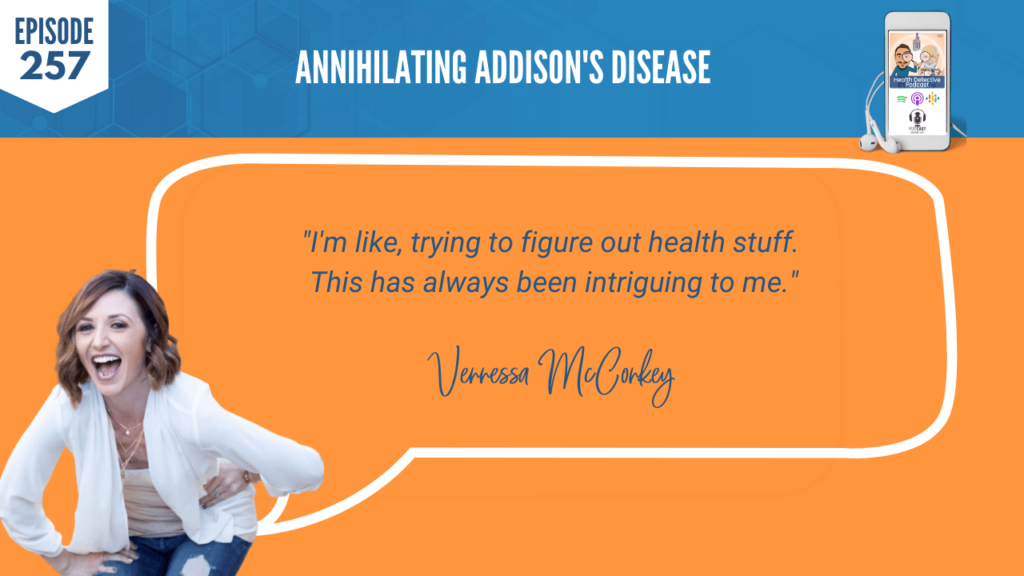
Vennessa McConkey: Right? My husband’s sitting there drinking and I’m like, I’m not much of a drinker, but I’m really into this. And he is like, I’m going to go tour around. I’m like, trying to figure out health stuff. This has always been intriguing to me. Now I’m obviously old enough, I don’t need my mom telling me what to do. And I’m like, okay, this is intriguing to me.
Then, we had our fun. We came back and things just really weren’t feeling right to me. And I’m like, what’s going on? What’s going on? Then the week and a half before Thanksgiving, came back. My husband got really sick over Thanksgiving and then the kids got sick. Of course, mom can’t get sick. I was, but I can’t be sick, right? I had to keep pushing through and taking care of everyone else cause who else was going to take care?
Addison’s Disease: Breaking Out in Welts
No offense, men, but you don’t really do well with sickness. And so, I’d recognized over the years with my autoimmune conditions, it takes me like two to three weeks to recover from even a cold because my immune system was just so shot. Now it’s just like, oh gosh, something’s not right. I’m not healing from this, what is going on? I’m like I got the kids, I gotta keep them going. It’s the holidays. They’re wanting me to be excited and I’m not excited right now. I’m just feeling drained.
So, I’m talking to my naturopath and she’s like, okay, well maybe we need to modify some things with your thyroid stuff. Your Addison stuff looks good, but I’m really concerned about your thyroid stuff. And because stress is a big component of it, I’m like, all right.

Then all of a sudden, it was two days after I had a conversation with her, I break out from my chest to my stomach, to my back in just these big welts. I’m like, what in the world is going on here? It was disgusting. They were kind of itchy. But we had measured, we had gone and got some testing. I didn’t have any histamine issues, like that was almost non-existent. I was like, that’s weird.
As I was starting to study some of the FDN stuff, I’m like, that’s weird. Okay. Like what’s going on here? I went in and I was doing like Myers’ cocktails IVs. I’d be sitting in my doctor’s office, and she was pumping me with stuff. She’s like, okay, it’s an immune thing. Let’s just boost you and boost you and boost you and boost you.
Addison’s Disease: A Third Autoimmune Condition
So, I’m sitting there with a baby, and I’ve got my husband taking the other two. I’m studying, trying, at the same time, cause you sit there for like three hours getting pumped with this stuff.
I’d feel better for like a day, maybe afterwards, but I still wasn’t sleeping well. And I was still waking up drained. I’m like, this can’t be how this is supposed to be. What is going on here? So then, after doing three weeks of that, my naturopath is like, okay, let’s go to a dermatologist. I have one in the same complex as me. We work together. Go to the dermatologist cause nothing’s getting better. It’s actually getting worse. We’re trying everything that I know, and I’ve been doing this for almost 40 years. She goes, I hate to tell this to people, but I have no idea.
[00:26:40] Detective Ev: Hey, I appreciate the honesty. We need more of that from functional and Western medicine. It sucks that she couldn’t help, but I appreciate that.
[00:26:46] Vennessa McConkey: Right. And I had found out that she had Hashimoto’s too.
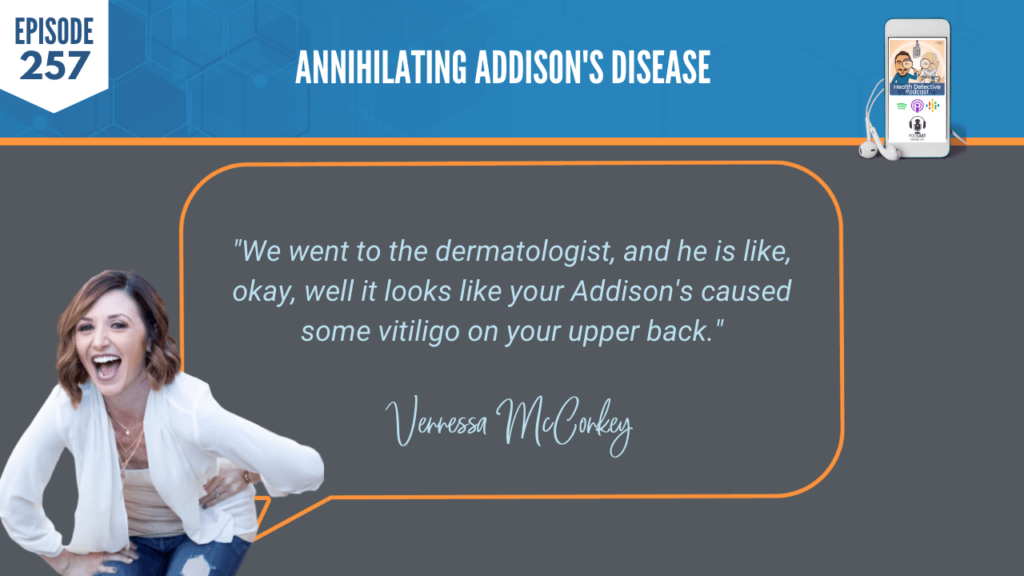
She’s like, I just don’t know. Like, she goes, you’ve got little ones at home. It’s not like you can go run away to a retreat for a month or something like that to get rid of the stress. You’re just going to come right back to it. Something’s going on. So, we went to the dermatologist, and he is like, okay, well it looks like your Addison’s caused some vitiligo on your upper back.
I’m like, great. Now I’ve got a third autoimmune condition but what with the welts? And he is like, I don’t know. I’m like, are y’all kidding me right now? Like I am suffering.
Addison’s Disease: Finding Drugs
I already wasn’t sleeping well and now I’m really not sleeping well. He is like, I know you don’t like medication. Let’s get anything on you to get you some sleep and start relieving some of the pain and itching. He gave me some topical cream. I was like, all right, fine, whatever. So, I got some rest and all of a sudden it started disappearing.
In engineering school, I was literally trained in root cause analysis; I went to training for it. and I’m like, what is the root cause? What just happened here? I am a Christian and I’m like, God, I know sometimes You don’t tell us all the answers, but I need an answer. Why is this happening? What happened; what did I do or not do? Like, what is this? What’s going on?
So, then it was right around Christmas, right after Christmas. I was like, okay, we got through Christmas. We didn’t have any family in town or go anywhere. It was nice and relaxing.
This is always hard for me to tell people because from being so tenacious and big into all the work that I’ve done, the success that I’ve done over the years in corporate and things like that, stats, and with my health and all these things. But my husband was taking care of me and he’s like, I’m going to take a day off, blah, blah, blah. I’m going to go pick up the kids, they were at the YMCA, and I’ll come back.

And I was like, he’s so sweet. Let me write him a note and put it in his bag for work the next day and I found drugs. So, my body was kind of telling me something in my environment was going on.
Addison’s Disease: Moving Back to Illinois
I had to confront him about it. I’m like, you literally live with someone who does natural stuff, has a lot of stress and stuff going on, and now this. He was like, you know what, it’s all legal. And I’m like, just cause it’s legal, doesn’t mean, you know, whatever. It was a big battle, and it added more stress.
I’ve been in counseling for years. We were in counseling at that time. I was in counseling prior to that and whatnot, just for all kinds of issues, right? All of my autoimmune stuff, why is this happening? I highly recommend it for people just to have someone on the outside to talk to.
And I had gone to my counselors, I’m like, oh my gosh, now what? Now what do I do? This is a big stress. I’ve got three little kids at home, he’s using, I don’t even know how long and what kinds. That’s not my area of expertise. I know what some things are, but I don’t know everything. They were like, you know what? Let’s see how it goes; let’s work on you. Keep doing the FDN stuff, learning about you and healing and whatnot.
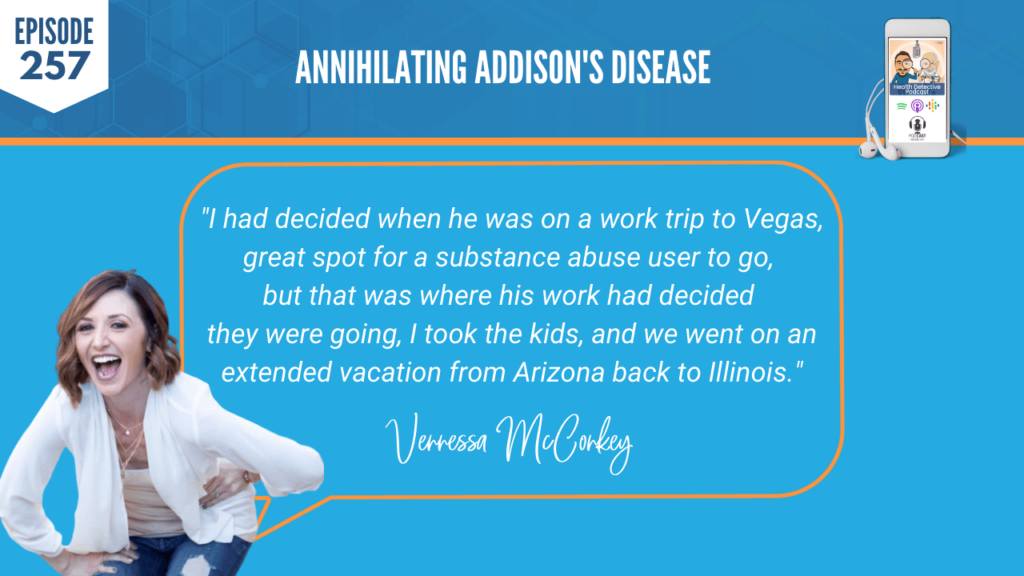
It just got to a point I was like, nothing’s changing at home. It’s too stressful. I can’t sleep now again. What’s going on? So, I had decided when he was on a work trip to Vegas, great spot for a substance abuse user to go, but that was where his work had decided they were going, I took the kids, and we went on an extended vacation from Arizona back to Illinois. We sat there and we were with my family. His family knew. Everyone was very aware before we even made the move.
Addison’s Disease: A Drug Free Husband
It was stressful cause we’ve got now me and three little boys, whom I’ve uprooted from school and from what they knew as home, back to my childhood home. It’s not like we had a small home, but you’ve got three adults now who are all parents trying to parent three kids and deal with the situation. And so, it was really stressful. In all of that, we were there for seven months.
My parents did what they could or whatever. But in all of that, I found that the relationship with them was not good. So, I thought I was leaving a toxic environment that was causing a lot of stress and health issues and things like that and went into a brand new one. Well, it wasn’t brand new, but I thought it was brand new at the time. But it was something that I experienced all throughout my childhood. It was a lot of emotional and verbal abuse and neglect.
It was, oh, okay, you guys have been here, we gave you your basic needs, and now we’re going to go. They both are business owners, let’s go to our work now. The boys and I were left to fend a lot for ourselves. Yes, we grew up here and whatnot, but I was like, I really need my mom and dad. I really need them.

And so, in transferring counselors across state lines and stuff like that, my husband and I were working on reconciling. I had filed for divorce and that got his butt moving. He’s been clean for over a year and a half now. That’s such a blessing and he won’t touch it again, any of that stuff.
Addison’s Disease: Starting to Heal
We found out he was using because of childhood issues he had with his parents. It’s been a whole bunch of mess. But in all of this too, now with my counseling, we had found out I had complex PTSD because of all the emotional abuse. So, let’s just add more, right? Just keep adding more and more and more.
And I say all this because the past year of going through FDN, now, I had to extend the course because of everything that happened. I still, every single day was going in and learning something and going through the course and whatnot. My parents finally kicked us out for no reason. So, we were left to fend again, literally, for ourselves.
My husband was still closing out Arizona and our home there. We had to find a place, but I was on my own and I was playing single mom. I still was able to complete the course, complete it very well, and go through with the mentors. They were like, Vennessa, this is amazing with what you’ve done.
What I did was I kept questioning the Addison’s disease. I’m like, the Hashimoto’s and stuff kind of makes sense, but I don’t understand the Addison’s. We had the tests run and stuff like that and I’m looking at them, the tests that we have run here in FDN.
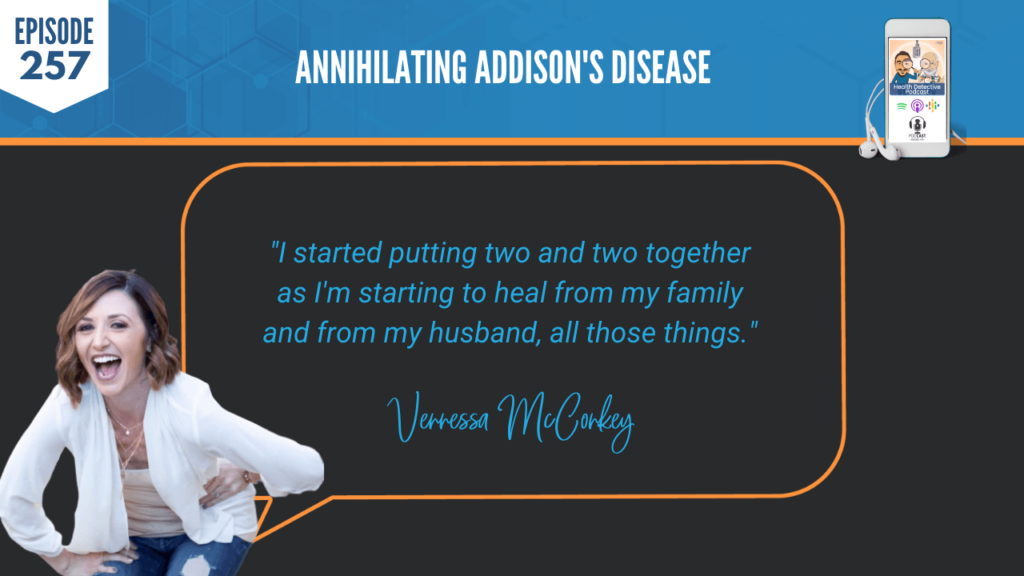
I’m like, okay, my cortisol does show low but it’s not like it’s an exhaustive stage. Everything else makes sense. Okay. So, I started putting two and two together as I’m starting to heal from my family and from my husband, all those things. I’m starting to get more stable emotionally and be able to think clearer and all that stuff.
Addison’s Disease: Weaning Off the Meds
I’m like, this doesn’t make sense. I’m in the exhaustive stage but it doesn’t correlate with Addison’s because my body’s still producing. So, I went through all of that and talked to my naturopath. And I said, hey, can we work out a plan where I come off of the hydrocortisone?
I sent her the results from FDN, and she’s like, okay. She goes, you have extra, right? You have your dosage. So, if worst case, you just pop it in and okay, we know that that was too low to go or something really still is going on, right? And I said, okay. We were still guessing. So, we had tested right, but we still were kind of guessing and playing around a little bit safely.

I safely wean down off of it. And I’m going to start crying here because I have now been off of hydrocortisone for almost a year. I’m telling you, no symptoms, like, I haven’t gotten worse in any way, shape, or form. So, that was never the problem. And I was like, okay, if I can come off of hydrocortisone, maybe I can come off the thyroid stuff.
We had switched from thyroid to a compound T3/T4. I was like, all right, that one’s a kind of a scary one to come off of. Okay. Let me see. I talked to her and she’s like, I don’t recommend it. But if you trust what you’ve learned and what you’ve graduated with, and you are also now board certified, like, okay, let’s see what happens. I’m here to support you. But again, you still have stuff there in case.
Addison’s Disease: Stress & Trauma
I have been now a year off of the thyroid medication. And now do I still have Hashimoto’s and overt hypothyroidism? Yes, I do, but I’m managing it. And it’s almost into remission through diet and lifestyle changes.
I’ve reviewed it with Dr. Alan Christianson, who is a well-known endocrinologist. He’s like, literally, medication won’t help you. He goes, you’ve been through a lot, your trauma and things like that. You keep managing your trauma, managing all that stress reduction. Keep working on the things of breaking the generational chains in your family and whatnot.
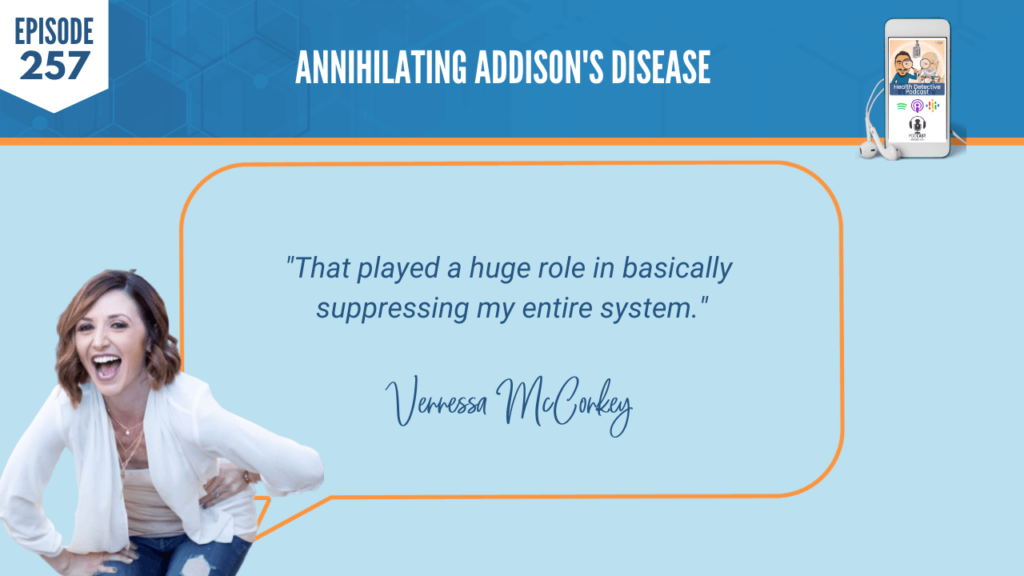
Because with the HPA Axis, we know that stress is massive. It is a very, very big deal. The trauma that I’ve endured through the emotional and verbal abuse and neglect, we found out there was some physical too there. That played a huge role in basically suppressing my entire system.
We ended up running the DUTCH test too, it showed my cortisol was high. It was really elevated because I was constantly, and still can be some days, in the fight or flight mode. I have that hypervigilance. And I’m like, okay, we’re in a new spot. Okay, what’s going on? Okay, like 4th of July, parades, literally congregate right outside my front lawn. And I was like, what’s going on?
But in all of this, I’m not going to say FDN saved me. I saved myself through the knowledge and the practice of all of it. It breaks my heart for those who have gone through any kind of trauma, whether it’s childhood trauma, any kind of war trauma, PTSD, whatever it may be, that they’re not working with someone most of the time that can correlate their symptoms.
Addison’s Disease: The Body Keeps Score
The fatigue that I had was because of my constant fight and flight. I was constantly, for almost 40 years now, in hypervigilance state all the time. My body didn’t use up, as the doctor said right back with Addison’s disease when I was “diagnosed”, use up all of my cortisol. It was just being displaced is what it was, being used for things that it wasn’t supposed to be used for.

And if anyone wants to read an amazing book, The Body Keeps Score is a really, really great book. Because our body does keep score of everything that’s happened to it in its environments, via food, exercise. I found out I was exercising too much because I wanted to just burn that energy, that frustration, and all that stuff, and it hurt my body. So, I was stressing it out even more cause all of that creates so much inflammation.
Then, I ended up through FDN, found out I had H. Pylori, candida, like all these different infections and stuff going on because my immune system, through the medication, through the stress, through everything that was happening around me, whether I was doing it to myself or other people had done it to me, my body just kept score of it. It was just creating this massive chaos in my body that was going on. And it was just exhausting me and created things.
If anyone’s gone through this, you go through an angry phase of why did this happen to me? What in the world? Why did I deserve this? What did I do to myself, what did I not do to myself? Why did these people do this to me? And then it came into grieving of, okay, now I have something I’ve gotta do.
Addison’s Disease: Middle Child’s Tummy Issues
Through all of this, even right now, I’m working on literally a case study with my son. The middle child has had so much stress. Like I said, he’s the whiner and the crier and whatnot. But that shows that something is going on.
Last year for example too, he was struggling in kindergarten to speak up. And I was like, what’s going on? This kid is very vibrant and whatnot at home. Okay, I get it. First time in school. All right, fine. But literally this morning him and I had this conversation cause we got his stool map test back.
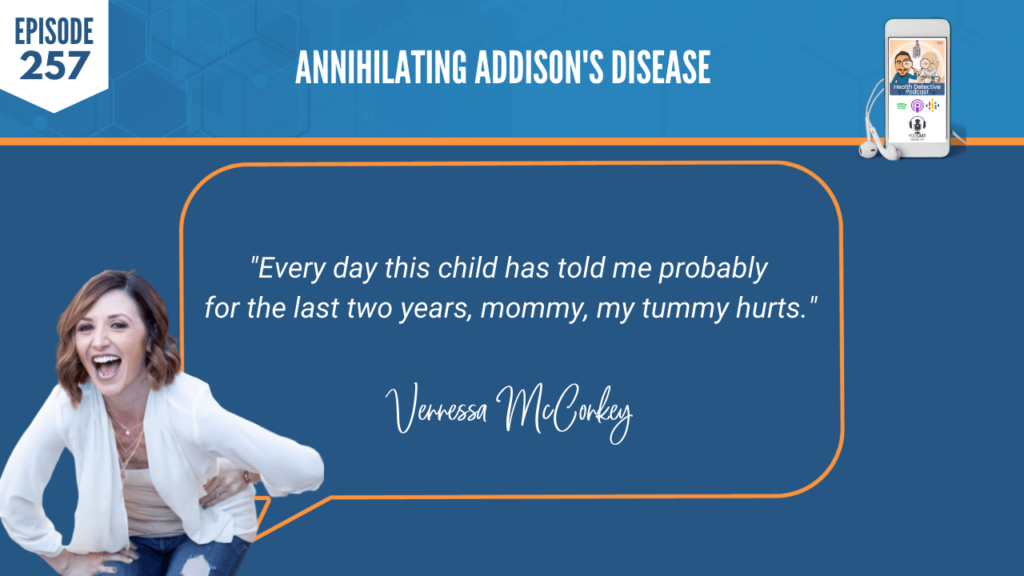
We found out that he has some really hefty, hefty secretory IgA, very high, anti-gliadin IgA, very high, calprotectin, high. And so, he’s got some celiac issues going on. With all the trauma and stuff that we’ve had going on in our family, he was having a lot of diarrhea. Every day this child has told me probably for the last two years, mommy, my tummy hurts. Part of me is like, okay, I feel for you. Part of me is like, come on dude, you had candy yesterday, you know? But really his tummy was hurting.
With me knowing what I know from FDN and helping other clients and helping myself, I’m blessed that I was able to have the conversation with a little six-year-old and say, Hey buddy. Were you having a hard time speaking up in class last year because your tummy hurt? Yeah.
We put him in social work, we’re like, what’s going on? And he started to have some success there, but it was really because his stomach hurt so bad. So, we have a plan now, and that’s what’s great that I love, is having a plan.
Addison’s Disease: A Proven Process that Works
Like we learn in FDN, and anyone who’s been through autoimmune conditions or chronic illnesses or anything, the path to healing is never linear. It’s always, back and forth, it’s up, it’s down, it’s all over the place. Sometimes something hits you like a death or something and it completely destroys you because, again, your body’s keeping score of stuff.

But we have a very, very proven process. It’s going to be just a hair different for everyone just because of their lifestyle, their environments, maybe some genetic factors, some things going on with their lives. But we have a proven process of that D.R.E.S.S. protocol that works. I mean, I will stress, no pun intended, stress, the stress part of it’s because that has been just such a massive success for my story.
Yes, it’s food; yes, it’s exercise, things like that. But it’s been a journey and I’m just happy to be on it now that I’m on the lighter focused end here versus the dark end that I was in. But if you keep following the plan and keep following the process, it’s like learning engineering. You can’t just implement it one time and it’s done. You keep going and you keep following the process and you see the success along the way.
It just lights me up when I get to connect the dots with people. I would’ve never expected the trauma that I had, I would never have uncovered the trauma that I had and be working on that if I didn’t go through FDN. Or I might have, but it would’ve been years and years down the road in a hospital bed or something like that. Not that I haven’t been in hospital beds before for this stuff.
Detective Ev: Yeah, I gotcha.
Addison’s Disease: The Right to Advocate for Yourself
Vennessa McConkey: Lots of them. But it’d be a different story. I want to be there for my kids, and I want them to, as we’re breaking generational chains in terms of trauma in our family and abuse, that we’re also breaking generational chains in terms of health.
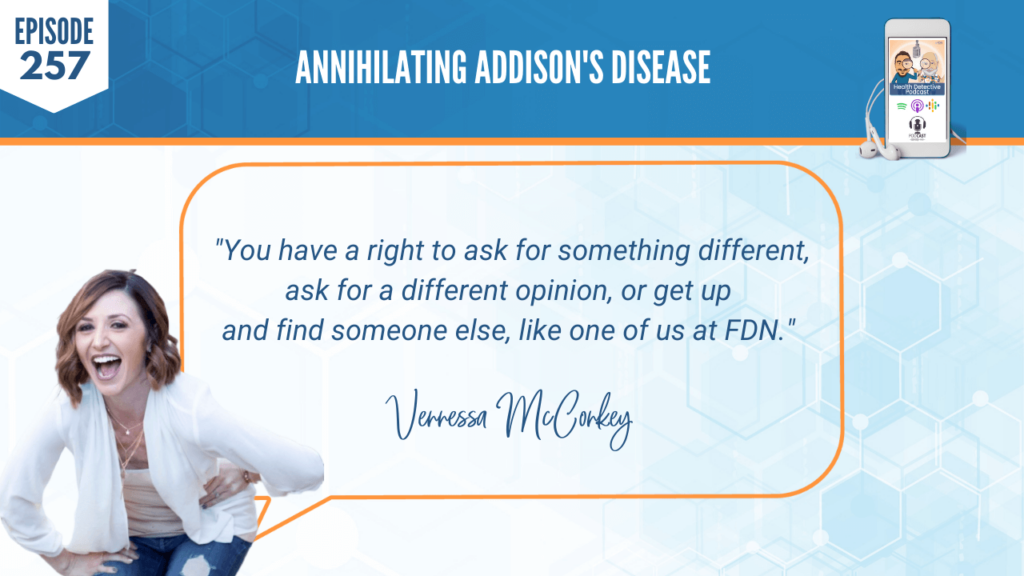
I tell my clients all the time, advocate for yourself. That doctor, they do have their place in situations that are lifesaving. But just because they say take this or do that, doesn’t mean that you don’t have to question them. What you’re feeling in your body is legit. They are not living in your body every single day and dealing with all those, what I call, the in-between moments. They’re not, you are. And you have a right to question them. You have a right to ask for something different, ask for a different opinion, or get up and find someone else, like one of us at FDN.
Say, hey, you know what, you guys have all been through this. And that’s the great thing too, is we’re not like a lot of the other medical professionals out there who haven’t been through the stuff that we’ve been through. We’ve been through it, and we don’t, I always tell my clients too, I don’t make you do a test that I haven’t done myself. I don’t.
[00:42:06] Detective Ev: One, we’re going to have to do a part two at some point. I mean this seriously, I’m not a flatterer. I go out of my way to find things I like in people. And I do go out of my way to compliment that, but I don’t flatter that. I mean, you nailed it, right? Because there’s so much going on here.
Addison’s Disease: On the Winning Side
I mean, sometimes I’ll intervene if the person’s going on too long. But like, you’re a fantastic storyteller. Fantastic might not be the adjective we want to use when we’re talking about such serious stuff, but I mean, it’s engaging. You got me emotional. It’s like, holy cow. I don’t know if you’re even intentionally doing it, but there’s so many of these cliffhangers. When I find out the husband is like, okay, good to go now, I’m like, yes, he did it because of the divorce.
I actually look at that cause I’m someone unfortunately who has abused substances. It’s not my place cause I don’t know the whole situation, but I will tell you this; most people will lose everything before that happens. So, the fact that divorce is a trigger enough to get through the drugs, that person loves you, just so you know, if that’s not obvious. It’s not an excuse to go do it to begin with.
Vennessa McConkey: Don’t. Please y’all, don’t do that.
Detective Ev: Right. There are people that will take drugs stuff to the grave. They will lose everything along the way.
That feeling of losing you and the kids outweighs the drug withdrawal. Drug withdrawal sucks and it’s very short term, you don’t think long term with it.
Vennessa McConkey: Oh, trust me, we’re dealing with it even now.

Detective Ev: I love to see the light; you used the word the light. It’s very cool to actually be with you right now on this journey, very much on the journey, but on this winning side and having the path and the plan, like you said.
Addison’s Disease: Making Choices in Desperate Situations
In the beginning, your personality was just like the drive and all this kind of stuff. Like, hey, I don’t have time. Let’s get this fixed. I gotta go. We definitely have something in common there. It’s cool to see how this is being used now.
One thing I want to make sure we get to at least shout out today, there’s two things actually. So, one, especially in the first 20 minutes or so, there’s details that seemed simple, but I really appreciate you sharing them because they’re actually not. What you are going through or have gone through is such a standard process in a certain sense. Everyone’s unique, but like this whole, hey, well, I’ll just try this, or I’ll stop the medication.
And you even, you use the right words. You’re like, I don’t really know why. I just felt like maybe I should do this. You’re clearly an intelligent person with a background in this to some degree. You have family influence and stuff in it, but that’s what happens to us. It’s just a human thing.
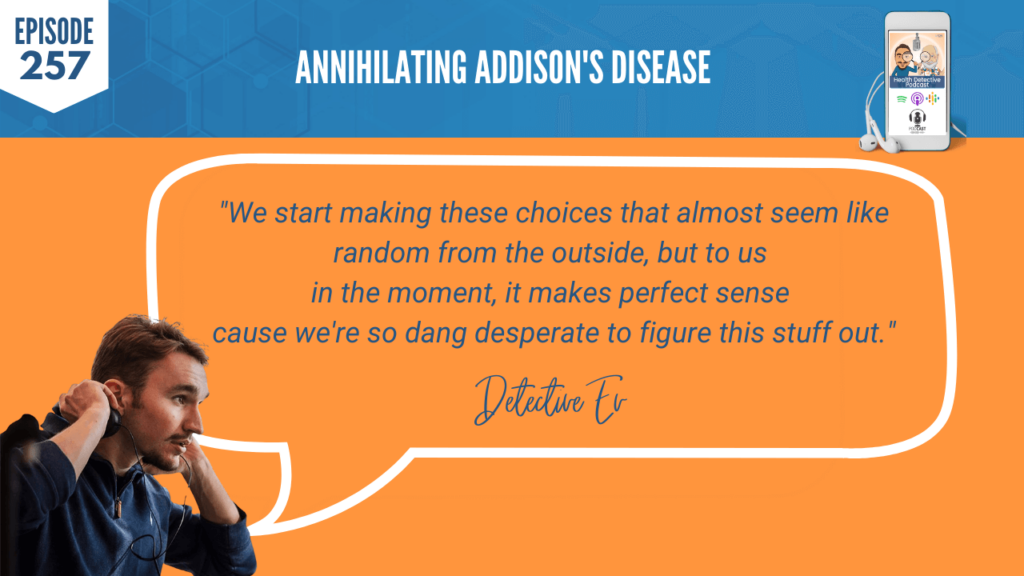
We’re confused, we’re scared. We don’t know what the heck is going on. And so, we start making these choices that almost seem like random from the outside, but to us in the moment, it makes perfect sense cause we’re so dang desperate to figure this stuff out.
I’m just so glad that someone like you, not only has these answers now, but you’re out there working with people. That was the second thing for me. I mean, you didn’t graduate, in the grand scheme, like that long ago. I’m not surprised that someone like you is hitting the ground running and taking clients. But were you taking clients prior to graduating FDN or was it only after?
Addison’s Disease: Tracking All the Health Complaints
[00:44:45] Vennessa McConkey: So, when I was doing the career coaching and resume writing business, I had noticed that my clients are seeing success, but they keep coming back to me. I’m wondering why. You know, you mentioned, and thank you, I appreciate this for saying like, you’re such a good storyteller. I love to engage with people and I love to hear their story. Their stories inspire me to share more and all that type of stuff.
So, a lot of people come to me, even in corporate, people will come and sit down in my office and be like, so I’ve gotta tell you something. And I had one guy, I’ll never forget him. He came down and sat down in my office chair. He was like, so, I’m thinking about divorcing my wife. I’m like, okay, to HR, please. I can’t discuss this right now.
Detective Ev: Nope.
Vennessa McConkey: Right. But they felt comfortable sharing with me. And I’ve noticed that with all of my corporate people and my employees and my resume and career coaching clients.
And so, in that business, I had noticed people were coming to me and sharing with me, oh my gosh, you know, I’m struggling with some weight loss. Especially during Covid, like, I gained a lot of weight, or I can’t think straight. I don’t understand why I can’t do this. I’m tired.

So, I started tracking it, an engineer tracking things. I started tracking it in my database. I’m like, okay, this person is this and this person is okay, you know, whatever. And I found it was like 85% of my clients were having some kind of health issues.
Addison’s Disease: Coaching for Free
I love this business; I am good at it. I’m making a lot of money. And I was very quickly able to replace my corporate career numbers financially. But I was like, I can’t morally place these people into high roles in corporate. They’re making decisions for other people, and they literally are having health problems that are fogging that, those decisions, I can’t. So, I had to stop that.
Now I do have clients who still come to me from referrals. Most of mine always have come from referrals. And I just stopped that. So, in those in-between moments, again, in-between moments here, of me transitioning from the corporate into that, I found myself coaching for free, basically, which I don’t recommend. I was doing that because I care so much about people and didn’t know my value at the time in the health space.
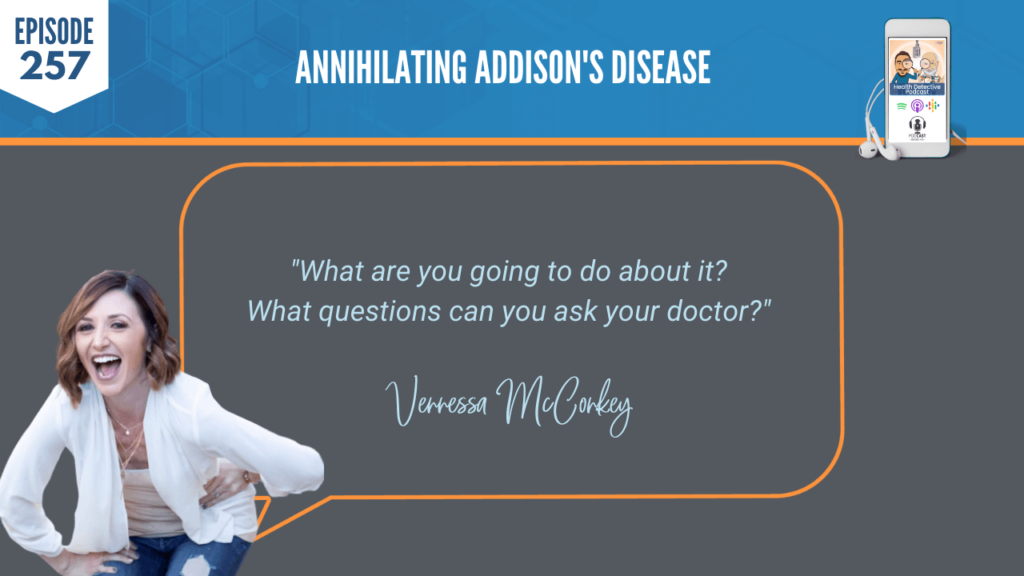
I was coaching them and saying, you’re having these conditions, you’re having these health issues. Like, what are you going to do about it? What questions can you ask your doctor? I was getting on some different interviews with other practitioners.
I was on a set of interviews with a lady named Nicole Broadhurst. She is an advocate for those with insurance, health insurance. We were talking about the questions you need to ask and things like that. So, I found myself in that space.
Before FDN even came into my world, I said, okay, I’m going to start taking on some people and start coaching them through some of the mental aspects of autoimmune conditions and what you should be thinking about yourself, telling yourself, some of the stress reduction, and some of the diet aspects of it that I knew at the time of how to get through everyday moment.
Addison’s Disease: Unable to Stop Talking About It
I still have a girl, Sarah, who reaches out to me. She’s like, oh my gosh, Vennessa, I’m struggling again, and I just want to hear your voice. Can you send me a voice recording? I just want to hear your voice.
And I was like, why? She goes, it’s just so soothing sometimes just to be able to listen to the words that you say. They just help me. I play them over and over now for my newborn daughter and me and they help me. So, I was taking clients at that time not even knowing really what I was going to be diving into and exposing in this world basically.

Then I told myself, that tenacious individual that I am, I’m like, okay, after I graduate, I’m taking three months off of not doing anything. Literally someone had to hold me down. And my counselor was like, yeah, okay. I’m going to see how long this lasts, Vennessa. And it didn’t because I just kept talking about it and talking about it. Even on my own podcast too, my story is a four-part series on there of telling the in-depths of it.
If you don’t know who you’re working with and you don’t know their story, why are you working with them, just for their credentials?
[00:48:34] Detective Ev: Yeah. Very good point. Once we’re off air, we can figure out a time that we can get something sooner rather than later. It doesn’t have to be next week. But something sooner rather than later for a part two of this. Actually, in a perfect world, I would do this with everyone if they could fill an hour with the story.
Conclusion/ Where to Find Vennessa McConkey
No disrespect to our guests. Not everyone can do that. It’s just, some people got it and it’s very amazing when they can do that. So, I’d like to have you back on for the sake of today then. I mean, you’re going to have people reaching out with something like this. So where can people find you if they would like to work with you?
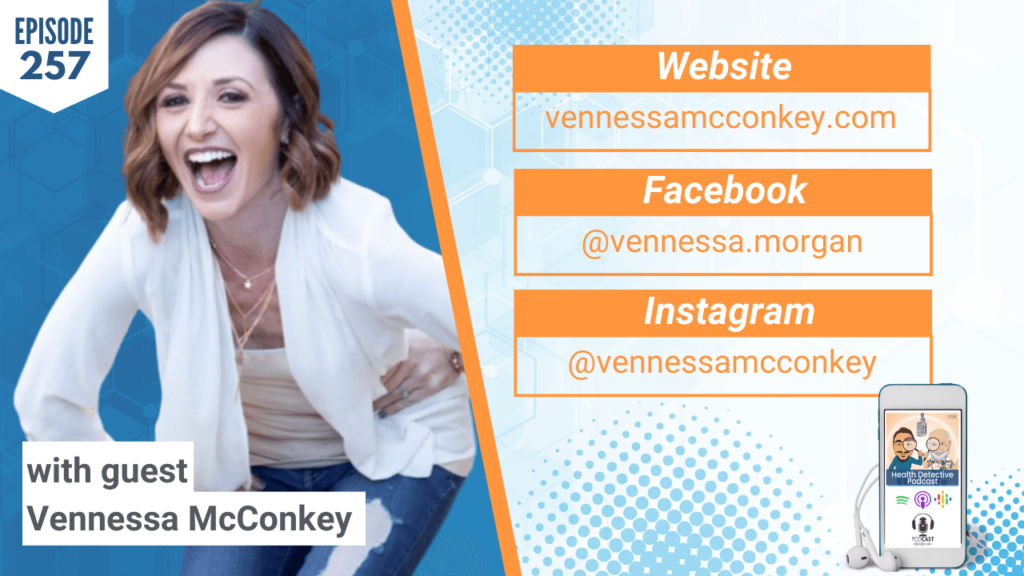
[00:49:04] Vennessa McConkey: Yeah, so I’m definitely on Instagram at @vennessamcconkey. You’ll see how to spell my name in the show notes there. It’s a different Vennessa. Then on Facebook, @vennessa.morgan. You can go to venessamcconkey.com. That website is still kind of in progress, so by the time this releases, it should be up and running there. There’s lots of freebies and stuff that I have available in terms of how to get you going, and then my programs also as well.
Detective Ev: What’s the podcast called by the way?
Vennessa McConkey: The podcast is called Designing the Best You.
[00:49:34] Detective Ev: Nice. All right, awesome!
Vennessa, we’re looking forward to having you back on. Thank you so much for just coming out and pouring your heart out. I think this makes the best podcast. It’s heavy. But at the same time, I don’t want podcasts where I’m just going in and out of it cause I’m so distracted by something else. I like something that gets you going a little bit. It’s motivating; it’s inspiring. So, thank you for today, very much.
[00:49:56] Vennessa McConkey: You’re welcome. Thanks for having me on. Look forward to part two.
You can always visit us at functionaldiagnosticnutrition.com. Our Instagram handle is @fdntraining.
For more informational and functional health-oriented podcasts like this one, go to functionaldiagnosticnutrition.com/health-detective-podcast/.
To learn more about us, go to functionaldiagnosticnutrition.com/about-fdn-functional-testing/.

